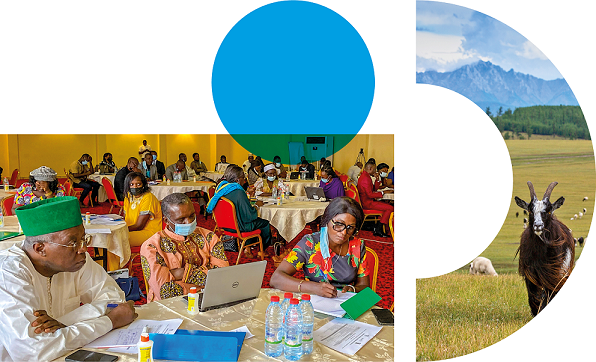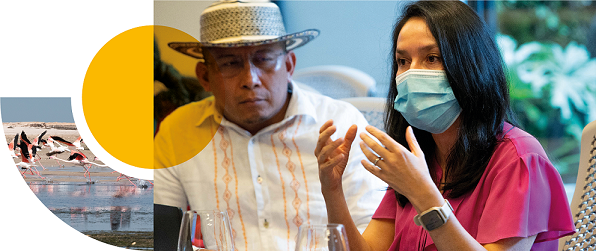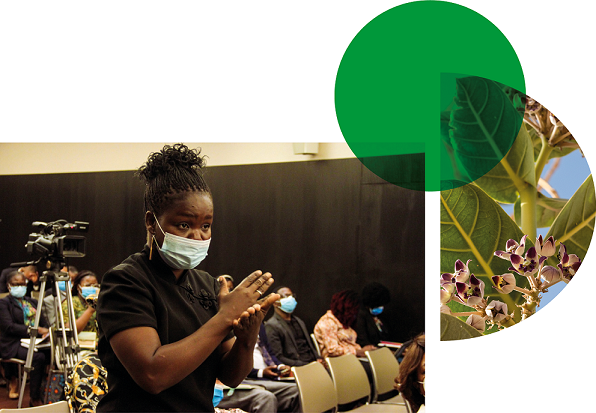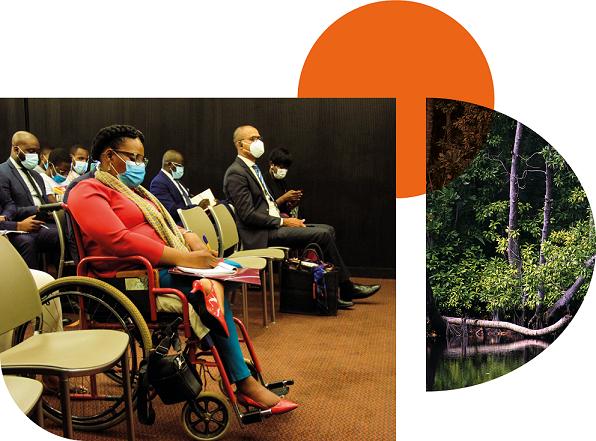Executive Summary
‘“Stockholm+50: a healthy planet for the prosperity of all – our responsibility, our opportunity’ was a high-level international meeting held from 2-3 June 2022 in Stockholm, co-hosted by Sweden and Kenya to commemorate the 1972 United Nations Conference on the Human Environment and celebrate 50 years of global environmental action. Anchored in the Decade of Action, it was designed to accelerate delivery of the Sustainable Development Goals (SDGs), the Paris Agreement and the post-2020 global biodiversity framework, and to encourage the adoption of green post COVID-19 recovery plans. Stockholm+50 focused on tackling the triple planetary crisis – climate, nature and pollution, with discussions centred around three Leadership Dialogues (LD):
-
Leadership Dialogue 1: ‘Reflecting on the urgent need for actions to achieve a healthy planet and prosperity for all’.
-
Leadership Dialogue 2: ‘Achieving a sustainable and inclusive recovery from the COVID-19 pandemic’.
-
Leadership Dialogue 3: ‘Accelerating the implementation of the environmental dimensions of the 2030 Agenda in context of the Decade of Action’
As part of the participatory and inclusive Stockholm+50 process designed to reflect the richness and diversity of all voices and perspectives, the Government of Sweden provided financial support for national consultations across 56 developing countries. The United Nations Development Programme (UNDP) facilitated the national consultations through financial and technical support provided to governments and other national stakeholders.
The objective of the national consultations has been to stimulate an inclusive gender-responsive whole-of-society and whole-of-government dialogue on the main themes of Stockholm+50 and the Leadership Dialogues as they relate to each national context.
This Global Synthesis Report presents the findings and recommendations of the national consultation reports to inform post-Stockholm follow-up and to help consolidate national policy frameworks such as the Nationally Determined Contributions, National Adaptation Plans, National Biodiversity Strategies and Action Plans, and green recovery and sector strategies. This Global Synthesis Report is based solely on the national consultation reports. While synthesising the views expressed by many diverse stakeholders and reflecting a broad consensus on many issues across countries, the findings are not accompanied by scientific references and do not purport to be analytically comprehensive.
Scope of the Global Synthesis Report
Stockholm+50 national consultations were carried out in 56 countries and engaged over 50,000 people through the in-person, hybrid, and virtual events. This Global Synthesis Report compiles information from the 54 national consultation reports submitted by the countries, representing the voices of over 41,300 participants from various stakeholder groups.
Section 1 of the Global Synthesis Report presents the objectives and outcomes of the global Stockholm+50 meeting and the role of the national consultations in achieving Stockholm+50 goals. Section 2 presents an overview of the national consultation process (the participating countries, tools, technical guidance, and facilitation provided by UNDP, the United Nations Environment Programme (UNEP), Sweden and other partners) and key statistics on the level of engagement in the national consultations. Section 3 focuses on the challenges and opportunities discussed in the national consultation reports. Section 4 presents the key findings of the national consultations in relation to Stockholm+50’s three Leadership Dialogues. Section 5 presents key messages from the national consultations and an overview of recommendations included in the national consultation reports. A synthesis of challenges, needs and recommendations for key sectors is provided in the Report Annex.
Sections 3 and 4 of the Global Synthesis Report align with the structure of the national consultation reports, synthesising the responses to the core questions addressed through the national consultations. Throughout sections 3 and 4 the findings from national consultation reports are organised under eight core themes, which are commonly addressed by all countries across all the Leadership Dialogue themes. These include: governance (including policy; laws and regulations; monitoring and reporting, and decentralisation); coordination and collaboration (including partnerships and multilateralism); equality and inclusivity; finance; the role of the private sector; capacity development; education and awareness as well as digital transformation, data, science and research. Some repetition in responses to consultation questions within and across the national consultations reports is evident, lending weight to the points made. This duplication has been retained to provide a standalone synthesis of findings across the main sections of the national consultation reports and three LDs.
This Global Synthesis Report does not cite specific countries. Some statements in the Global Synthesis Report are context specific, but many can be taken as common to all or many countries. The Report serves largely as a qualitative baseline of findings, which can be explored and analysed in more detail through the national consultations dashboard1, UNDP’s SparkBlue platform, and through the national and regional reports themselves.
Challenges, opportunities, and solutions
Countries face many common challenges, opportunities, and integrated solutions to the triple planetary rises. High rates of population growth and (youth) unemployment, food price inflation, migration and growing economic inequality and poverty hinder the transition to inclusive sustainable development in many countries. The following challenges and needs were consistently highlighted across the three LDs. Countries are challenged by weak environmental governance, a lack of political will and weak policies, laws, implementation, and monitoring. Limited decentralisation, the lack of long-term visioning, and insufficient coordination and communication across stakeholders in the design and implementation of public policies are often cited as constraints. Finance is critical to achieving commitments on climate and nature; however, it is not in place at the scale required. High national debt levels coupled with pressures from external shocks limit the ability of many governments to finance development projects and invest in climate.
resilience and nature. Private sector finance is crucial to addressing the financing gap and needs to be encouraged through regulations, incentives, and support for community finance, including grants and easy access to credit, especially for groups typically excluded such as women, youth, indigenous communities, and people with disabilities. Capacity building is needed at all levels – central and local government, the private sector, academia. Enhanced data and research facilities, green technology and digitalisation or digital infrastructure is also required. The need to enhance environmental education and awareness for all is a dominant theme across the national consultations including environmental education in school and university curricula and the strengthening of awareness-raising work of youth organisations through social media. The economic difficulties due to COVID-19 are widely recognised as presenting an opportunity to build back better. Green, blue, and circular economy approaches are levers for development offering opportunities and jobs, including for young people.
Leadership Dialogue 1: Reflecting on the urgent need for actions to achieve a healthy planet and prosperity of all

Building a positive relationship with nature requires Governments to prioritise environmental protection and move away from business-as-usual development models to models that drive an energy transition, resource efficiency and circular economy approaches. Equally crucial is long-term planning that goes beyond the political term of governments and strengthened collaboration across stakeholders. Sustainable finance needs to be mobilised at scale to accelerate investments in restoration, avert land degradation, deforestation and air/water pollution, and synergise investments in climate and disaster risk management. The need to scale-up private sector engagement in delivering NDCs and NBSAPS is undisputed. Pathways for scaling up private sector engagement include government incentives and Public Private Partnerships (PPPs). In turn, the private sector has a responsibility to internalise their ecological footprint, while the banking sector should play a greater role in supporting the transition to a healthy planet and prosperity for all. Education and awareness raising is identified as critical to restoring and regenerating a positive relationship with nature, modifying consumption habits and build societal support for sustainable and inclusive growth.
‘…Action against climate change and environmental degradation is also action for fairness and equality...’
Systemic and structural inequalities leave some groups more exposed to climate risks and environmental degradation than others, limiting their adaptive capacity and widening socio-economic inequalities. Human rights for a clean and healthy environment and other principles that provide protection and improved access need to be embedded in policies and regulations. The interests of disproportionally impacted groups must be mainstreamed into policies and initiatives from the local to global level. Engaging disproportionally impacted groups and communities in planning allows them to directly inform the identification and implementation of options best suited to their circumstances and needs while capturing the rich knowledge of local groups. Women’s leadership capacity and opportunities need to be facilitated to increase their participation in dialogues and decision making. The consultations highlighted the primacy of free, prior, and informed consent for any activities on indigenous land; the important role of social safety net programmes; and the creation of green jobs and income- generating activities that build resilience to crises and shocks. Specific credit and finance structures are needed to facilitate disproportionally impacted groups’ access to finance such as subsidies and/or grants and benefit-sharing mechanisms, including Payment for Ecosystem Services (PES) schemes.
Existing metrics are considered limited or inadequate to track progress towards a healthierand more prosperous planet. For example, the SDG metrics are considered too complicated and broad, and need to be tailored to national contexts and harmonised with national indicators. there is a lack of up-to-date data and information on the state of the environment. Often, the collection of environmental data at the local level is intermittent and dependent on project-based financing. Digital technologies and new data sources are needed for evidence-based, inclusive decision making, as well as for better transparency and monitoring of environmental health and indicators, including for natural capital accounting.
Leadership Dialogue 2: Achieving a sustainable and inclusive recovery from the COVID-19 pandemic
‘The transformation to a net zero and circular economy is necessary to achieve a sustainable and inclusive recovery from COVID-19 and is a key driver of green job creation and economic growth. Countries, companies and workers need to be ready for this transition.’

While a global transition to a low-carbon and sustainable economy can create a large number of green jobs and become an engine for development in rural areas, the required structural shifts in global, national and local economies will adversely impact jobs, income, and communities built around declining industries such as coal mining. This in turn requires that just transition principles are an integral part of the transformation process.
A key role of government is to develop a conducive regulatory environment for green investments and the creation of green jobs through clear and stable policies, legislation, and incentives. To create better performing industries and supply chains a coherent country-specific mix of macroeconomic, industrial, sectoral, and labour policies must be promoted, supported by regulations and incentives that encourage industries to green their production chains, invest in the transition to low-carbon production and source nearer from home to reduce dependency on imports. Governments should also make Environmental, Social and Governance (ESG) principles mandatory for all businesses and financial institutions.
For businesses the transition will require agility, innovation, and creativity. They have a key role to play in promoting and integrating new decent green jobs into their operations and in developing new skills by investing in workforce training. It is crucial that companies comply with laws and regulations on environment and decent work, Corporate Social Responsibility (CSR) schemes, ESG reporting, internalising environmental impacts and targeting investments to accelerate the transition to sustainable production and consumption. Financial institutions should refrain from supporting projects that are detrimental to the environment, such as energy production from fossil fuels, and only support projects generating a positive impact on the environment. ESG issues need to be integrated into investment analysis and decision-making. Banks should make their products more accessible, especially for youth, women, and other groups whose access to credit and financial services is constrained.
Workers must be prepared for new practices and jobs through capacity building, skills transfer and training. Targeted support is especially needed for those at risk of being left behind, including workers in the informal economy, indigenous and tribal peoples, women, youth, and small-scale farmers. The application of local knowledge, valuing local products and identifying appropriate technology are all highlighted as important means of strengthening the capability and skills of local communities, particularly women and other hard-hit groups, to generate income from, for example, agriculture, forestry, and community-based tourism.
Technology and digitalisation are acknowledged as key accelerators for inclusive sustainable development. They present opportunities for greater resource efficiency, traceability, and green jobs and livelihoods. The shift towards digitalisation during the COVID-19 lockdown in areas of education, commerce, government services, food and medicine delivery marked a shift for many individuals and organisations. Low access to the internet and digitalisation opportunities, however, faced by disproportionately impacted groups adversely affect people’s lives in multiple ways. Policies that advance digital equity and close the digital divide through accessible and affordable digital infrastructure and investment in digital literacy are required.
Leadership Dialogue 3: Accelerating the implementation of the environmental dimension of sustainable development in the context of the Decade of Action
‘Minor changes to the status quo will not provide the momentum needed to address the existential crisis faced. Global environmental action needs to be raised and accelerated, while ensuring that differences in national capacities and contexts are taken into account.’

The national consultations highlight the interlinked environmental, social, economic and health challenges impeding implementation of the 2030 Agenda and other environmental commitments. The complexity and difficulties of addressing these challenges are compounded by the urgent need for action and the fragility of the global economy. Progress is too slow and, in some instances moving in the wrong direction. The global economic crisis due to the COVID-19 pandemic and war in Ukraine is resulting in increased poverty and food insecurity. As a result climate change and nature are seen as less of a priority despite their direct links.
Protection of the environment and promotion of sustainable development are common responsibilities of all countries and can only be achieved through multilateralism and international cooperation. This is especially critical on issues where the window to implement change to avert irreversible damage is fast closing, such as carbon, methane and HFCs reduction. The achievement of the SDGs requires strengthened cooperation and shared efforts
between states (North-South and South-South), the international community including financing agencies, and stakeholder groups in each country, supported by international networks to exchange experiences and best practices and technology. The national consultations noted, however, a lack of solidarity and partnerships between developed and developing nations and weakening multilateralism due to the polarisation of powerful nations and proliferation of armed conflicts around the world. Multilateral Environmental Agreements (MEAs) are considered too technical and high level and need to be translated and simplified so that communities, environmental organisations and individuals are able to understand and translate these commitments into actions tailored to the needs of their countries.
Developing countries require finance, technology transfer and capacity building to achieve their sustainable development goals. As expressed across the different sections of the national consultation reports, the international community should respect its financial commitments, for example, under the Paris Agreement on climate change and emerging post-2020 global biodiversity framework. They need to ensure a fair distribution of economic resources, concessional finance, and technologies so that countries with less responsibility for climate change can and environmental degradation make a sustainable transition and meet social needs. To align public, private and development finance with existing commitments and priorities and to improve the business climate for sustainable development the public and private sector must work together. Governments have a leading role in creating the enabling policy and regulatory environment for accelerating finance towards existing commitments and coordinating the mobilisation of resources from diverse funding sources and mechanisms. The national consultations present a consistent narrative on what is needed to transform governance and legal systems to maintain long-term economic stability and ecological and social wellbeing for all. These key need include: political leadership and strengthened decentralised governance; participatory, gender-equal and inclusive decision making; ensuring that sustainable long-term visions and policies are honoured by politicians across election cycles; enacting and enforcing legislation (including incentives and sanctions) to ensure effective behavioural change; and enhancing monitoring, evaluation and accountability frameworks to promote transparency and support results-based management. The support of the UN system is crucial for the transition to a green, inclusive economy. It was stressed that the UN needs to strengthen its relationship and interactions with local government, civil society, community-based organisations, universities, small and medium enterprises (SME) and the private sector in general. This will help to ensure that official development assistance is implemented more efficiently, effectively, and inclusively including through equitable access and benefit sharing from various green financing opportunities.
Ongoing Follow-up

Building on the initial national consultations and outcomes of the Stockholm+50 meeting, UNDP has continued to facilitate follow-up dialogues with countries and communities throughout the second half of 2022. This ongoing engagement is contributing to the design and implementation of socially inclusive and gender-responsive national and sectoral policies, such as NDCs, NBSAPs, SDG Strategies, Green/Blue Economy and Green Recovery Plans. The findings of the national consultations are also being used to inform countries’ messaging on climate action, nature, green economy recovery and transition at other global events. These include UNFCCC COP27 in Egypt, CBD COP15 in Canada and G20 consultations in Indonesia. The national consultations are also informing UN and partner programming. A list of recommendations for both national and international actors is provided in Section.
